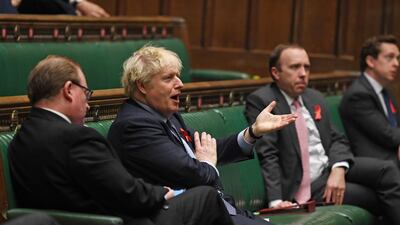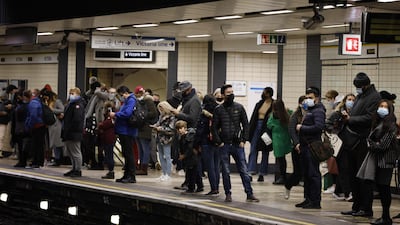England has emerged from its month-long coronavirus lockdown but most of the country remains under tough restrictions designed to clamp down on the spread of Covid-19.
The country had been in lockdown since November 2 to curb the infection rate and ease pressure on the hospital network.
However, 99 per cent of the country was placed under the toughest two levels of restrictions after the three-tier Covid alert system was approved in the House of Commons on Tuesday night.
Just 1 per cent of the country - the south-west county of Cornwall, and the far-flung Isles of Scilly, and the Isle of Wight in the south - is under the less restrictive level one.
The government said the move would help "safeguard the gains made during the past month", but 55 Tories still voted against Prime Minister Boris Johnson's plan.
It was the biggest revolt against Mr Johnson since he was elected last year.
Mr Johnson and Health Secretary Matt Hancock reportedly stood at the door of the room that rebelling MPs walked through to cast their no vote.
Craig Mackinlay, Tory MP for South Thanet, said a constituent had sent him a photo of their elderly father, who “looked broken” after months of lockdown.
“We are breaking older people where there is nothing left to live for,” he said.
Sir Charles Walker, vice-chairman of the powerful 1922 Committee, said older people needed to be consulted about coronavirus decisions, warning: “They’ve been denied the touch of the people that they love.”
"We have kept families apart for the good of an old person that is desperate to see their child, is desperate to be cared for by their daughter in their final months and weeks," he said.
He added: “They love their children and grandchildren and want to see them prosper, they want to see them have the same chances and opportunities that they had in their life.”
Across England, non-essential shops in "Tier 2" are allowed to reopen, hoping to improve a dismal year with bumper sales in the run up to Christmas - traditionally a money-spinner.
Mixing of households outside support bubbles remains banned under the guidelines, although individuals can meet in groups of six outside.
The capital and driving force of the UK economy, London, is in Tier 2, meaning pubs where food is served and restaurants can reopen, obeying social distancing rules.
But in Tier 3 areas, which take in some 23 million people and include Britain's second city Birmingham, hospitality venues will remain closed except for takeaways.
The restrictions have prompted fresh concerns for the economy, which finance minister Rishi Sunak said is facing a 11.3 per cent contraction this year - the worst in 300 years.
Those fears were stoked further this week by the collapse of retail group Arcadia, which owns popular high-street stores Topshop and Burton, and the Debenhams chain of department stores.
Both went into administration, blaming the impact of coronavirus restrictions on trade that was already under pressure from online competitors.
The main opposition Labour Party chose to abstain from Tuesday's vote, criticising the government for failing to offer more financial support to the beleaguered hospitality sector.
Last month, a survey of pub and restaurant industry bodies suggested almost three-quarters of UK hospitality venues would be forced to shut in 2021 without more government help.
Britain has recorded the highest number of fatalities in Europe in the pandemic with more than 59,000 deaths from some 1.65 million cases.
But Imperial College London study this week indicated the month-long shutdown helped push down the number of cases by nearly a third, raising hopes of less stringent measures.
The government previously announced plans for a Christmas reprieve, with three households allowed to gather indoors from December 23 to 27.
The tiered system - a different approach from the three other nations in the UK, Scotland, Wales and Northern Ireland, whose devolved administrations set their own health policy - will be reviewed every two weeks.
The first assessment is due on December 16, but the government has said a further relaxation of restrictions before Christmas is unlikely.











